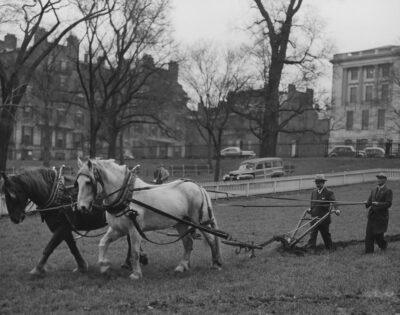
Throughout World Conflict II, American households answered the federal government’s name to develop “warfare gardens,” later referred to as “victory gardens.” These small, homegrown plots of greens turned symbols of self-reliance, patriotism, and resilience. Conflict gardens offered important meals provides throughout any international battle and lowered stress on the nation’s strained agricultural system.
They fostered a way of neighborhood amongst residents. At present, the teachings from these warfare gardens are extra related than ever, as meals safety stays a urgent concern in an unpredictable world.
The Function of Heirloom Seeds in Conflict Gardens
Heirloom seeds have been essential to the success of warfare gardens throughout World Conflict II. These seeds, handed down via generations, produced strong, flavorful, and nutritious crops. In contrast to many hybrid seeds out there right this moment, heirloom seeds have been open-pollinated, that means they may very well be saved and replanted yr after yr, making certain a sustainable meals supply for households. This was significantly essential throughout the warfare, as industrial seeds have been usually briefly provide and rationing made each useful resource valuable.
Greens like tomatoes, beans, cucumbers, and squash, grown from heirloom seeds, turned staples in warfare gardens. These vegetation have been hardy and adaptable, capable of thrive in quite a lot of climates and soil circumstances. By rising their very own meals, households may contribute to the warfare effort by decreasing demand on the industrial meals provide, which prioritized feeding troops abroad.
A Fashionable Name to Motion: Why Meals Self-Sufficiency Issues At present
In right this moment’s world, meals self-sufficiency is as important because it was throughout the Forties. International provide chains permit supermarkets to inventory meals from all corners of the world, however these methods usually are not infallible. Pure disasters, pandemics, geopolitical conflicts, and financial downturns can disrupt the move of products, leaving cabinets empty and households weak.
The COVID-19 pandemic highlighted the fragility of recent meals methods, with shortages of contemporary produce and different necessities in lots of areas. These experiences underscore the significance of being able to develop meals domestically, whether or not in yard gardens, neighborhood plots, or city rooftop areas.
The Advantages of Yard and Neighborhood Gardens
Cultivating a backyard, individually or as a part of a neighborhood, presents quite a few advantages. It reduces dependency on exterior meals sources, ensures entry to contemporary and wholesome produce, and saves cash in the long term. Moreover, gardening promotes environmental sustainability by decreasing the carbon footprint of transporting meals lengthy distances.

Rooted in resilience! Simply as warfare gardens sustained our nation within the forties throughout WWII, right this moment’s heirloom seed neighborhood gardens can encourage a brand new period of meals self-sufficiency.
Neighborhood gardens additionally present alternatives for neighbors to work collectively, share data, and construct stronger social bonds. In an period marked by digital interactions, gardening presents an opportunity to reconnect with nature and one another.
Planting Your Personal Seeds of Resilience
The time to arrange for tomorrow’s uncertainties… is right this moment. Individuals can draw inspiration from the warfare gardens of World Conflict II, utilizing heirloom seeds to develop nutrient-rich greens that nourish each physique and spirit. Beginning a yard backyard doesn’t require a lot area—containers, raised beds, and even small patches of land can yield a surprisingly bountiful harvest.
Neighborhood gardens, too, can function modern-day victory gardens, selling self-sufficiency on a bigger scale. Church buildings, faculties, and nonprofits ought to encourage and help these efforts, offering sources and schooling to assist residents succeed. In a world of complicated challenges, gardening stays a easy but highly effective act. We plant the promise of resilience, independence, and sustainability by planting seeds.
Simply as warfare gardens helped maintain a nation throughout its time of want, right this moment’s gardens can empower people and communities to climate the storms of an unsure future. Begin with heirloom seeds and let the legacy of these wartime gardeners encourage a brand new period of meals self-sufficiency.



